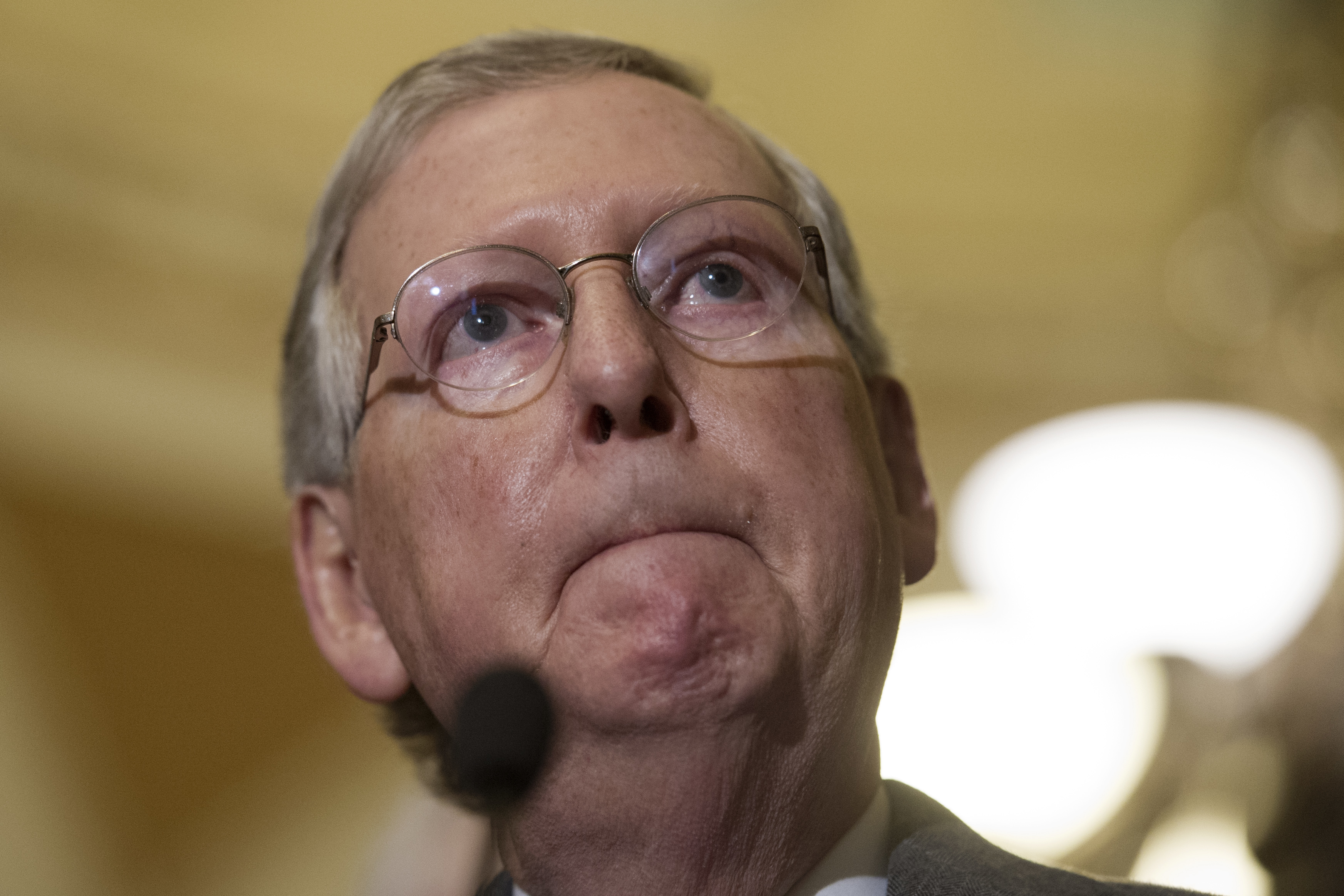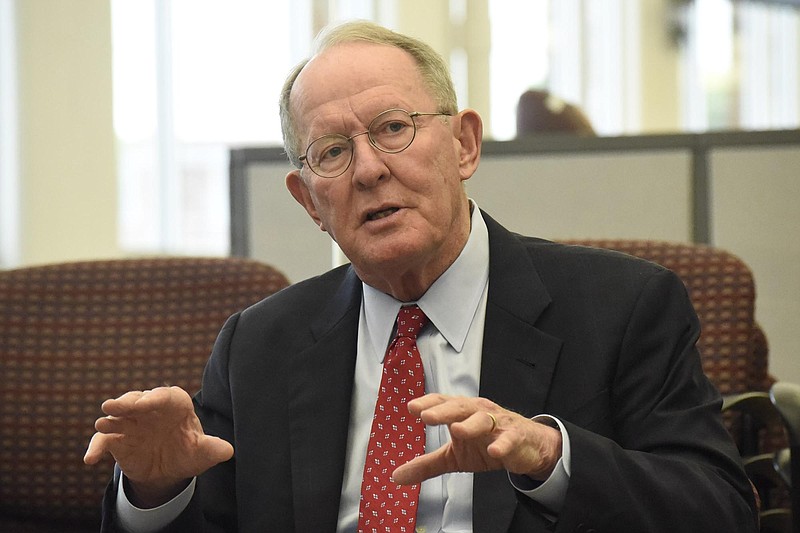 FILE - In this Jan. 4, 2017 file photo, Senate Majority Leader Mitch McConnell of Ky. pauses during a news conference on Capitol Hill in Washington. The Republican-led Senate is poised to take a step forward on dismantling President Barack Obama’s health care law despite anxiety among some GOP senators that they still haven’t come up with an alternative. (AP Photo/Cliff Owen, File)
FILE - In this Jan. 4, 2017 file photo, Senate Majority Leader Mitch McConnell of Ky. pauses during a news conference on Capitol Hill in Washington. The Republican-led Senate is poised to take a step forward on dismantling President Barack Obama’s health care law despite anxiety among some GOP senators that they still haven’t come up with an alternative. (AP Photo/Cliff Owen, File)WASHINGTON - The Republican-led Senate is poised to move forward on dismantling President Barack Obama's health care law despite anxiety among GOP lawmakers over the lack of an alternative.
Senate approval of a procedural vote and then House passage as early as Friday would trigger committee action to write repeal legislation that could come to a vote next month. A full replacement would follow sometime after that, presuming Republicans can come up with one.
"We must act quickly to bring relief to the American people," said Senate Majority Leader Mitch McConnell, R-Ky.
President-elect Donald Trump, who denounced Obamacare on Wednesday as "a complete and total disaster," said the health care reform adopted in 2010 will implode in 2017 unless Obamacare is changed. Trump said he is confident that the incoming Health and Human Services Secretary, Tom Price, can work with GOP lawmakers to repeal and replace the health care law "essentially simultaneously," even in the same day, week or hour.
But that could be difficult to achieve due to complex Senate rules, united Democratic opposition and substantive policy disagreements among Republicans.
Republicans plan to get legislation voiding Obama's law and replacing parts of it to Trump by the end of February, House Majority Leader Kevin McCarthy, R-Calif., said Wednesday. But other Republicans have said they expect the process to take longer.
U.S. Sen. Lamar Alexander, R-Tenn., chairman of the Senate health committee, said Congress should end the worst parts of the so-called Obamacare program immediately, but then develop better state solutions and alternatives before repealing the entire health care law and all of its benefits.
"To me, 'simultaneously' and 'concurrently' mean Obamacare should be finally repealed only when there are concrete, practical reforms in place that give Americans access to truly affordable health care," Alexander said in a speech on the Senate floor. "The American people deserve health care reform that's done in the right way, for the right reasons, in the right amount of time. It's not about developing a quick fix. It's about working toward long-term solutions that works for everyone."
Alexander likened what he said are the collapsing health care exchanges in Tennessee to handling a collapsing bridge.
"If your local bridge were 'very near collapse,' the first thing you would do is send in a rescue crew to repair it temporarily so no one else is hurt," he said. "Then you would build a better bridge, or more accurately, many bridges, as states develop their own plans for providing access to truly affordable health care to replace the old bridge. Finally, when the new bridges are finished you would close the old bridge."
In Tennessee, the state's health exchange cooperative - the Knoxville-based Community Health Alliance - shut down in 2015, and the state's biggest health insurer - the Chattanooga-based BlueCross BlueShield of Tennessee - dropped its individual health exchange plans in the state's three biggest cities this year. America's biggest health insurer, UnitedHealthcare, also dropped out of the health exchange market in Tennessee this year after coverage proved more costly than expected.
Premiums in the individual market have jumped 40 to 62 percent in Tennessee this year, although the overall increases in health care premiums for all Americans have risen at a slower rate under the Affordable Care Act.
The 2010 law extended health insurance to some 20 million Americans, prevented insurers from denying coverage for pre-existing conditions and steered billions of dollars to states for the Medicaid health program for the poor.
A group of Chattanooga supporters of Obamacare met with representatives for Sens. Bob Corker and Alexander on Wednesday, urging them not to remove key benefits they are relying upon under the Affordable Care Act.
April Cook, a retired nurse from Alaska who retired in Chattanooga seven years ago, said she the Affordable Care Act removed the $2 million lifetime limit on her benefits, which could prove critical since she was diagnosed with cancer three years ago.
"It doesn't take very long if you have a catastrophic event for medical care to cost a lot," she said, displaying a sign in front of the federal building Wednesday, proclaiming "Cure not chaos."
Ashley Saturday, a part-time worker in Chattanooga, said she couldn't afford the $600 a month cost of her former private health insurance plan but pays only $20 a month, after subsidies, for her health exchange plan under the Affordable Care Act.
"A lot of us would not have health insurance without the Affordable Care Act," she said.
A Senate procedural vote will set up special budget rules that will allow the repeal vote to take place with a simple majority in the 100-member Senate, instead of the 60 votes required to move most legislation. That means Republicans, who control 52 seats, can push through repeal legislation without Democratic cooperation.
But Sen. Susan Collins, R-Maine, said she wants to at least see "a detailed framework" of a GOP alternative health care plan before voting on repeal. She said Republicans would risk "people falling through the cracks or causing turmoil in insurance markets" if lawmakers voided Obama's statute without a replacement in hand.
House leaders planned a Friday vote on the budget, though Republicans in that chamber also had misgivings.
Many members of the conservative House Freedom Caucus were insisting on first learning details about what a GOP substitute would look like.
They also were demanding that once a future repeal bill becomes law, it should take no longer than two years to take effect. Some GOP senators have discussed a phase-in of three years or longer to give lawmakers more time to replace Obama's overhaul and make sure people now covered by that law can adjust to a new program.
"There's more elections and more uncertainty," Rep. Dave Brat, R-Va., a Freedom Caucus member, said of his objections to a longer transition period.
Some more moderate Republicans were unhappy, including Rep. Tom MacArthur, R-N.J., a leader of the House Tuesday Group of GOP centrists. He said he would oppose the budget because there was too little information about the replacement, including whether people receiving expanded Medicaid coverage or health care subsidies under the existing law would be protected.
"We're loading a gun here. I want to know where it's pointed before we start the process," MacArthur said.
